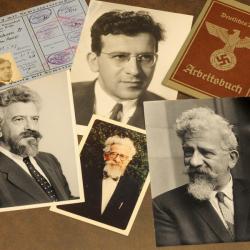
Duke University will acquire the papers of Rabbi Abraham Joshua Heschel, a scholar, writer and theologian who is widely recognized as one of the most influential religious leaders of the 20th century, the school announced Monday.
Heschel was a highly visible and charismatic leader in the civil rights and anti-Vietnam War movements. He co-founded Clergy Concerned About Vietnam and served as a Jewish liaison with the Vatican during the Second Vatican Council, also known as Vatican II.
The collection, which has never before been available to scholars, consists of manuscripts, correspondence, publications, documents and photographs spanning five decades and at least four languages. Included among the papers are notes and drafts for nearly all of Heschel’s published works, as well as intimate and extensive correspondence with some of the leading religious figures of his time, including Martin Buber, Thomas Merton, Eugen Rosenstock-Huessy and Reinhold Niebuhr.
The papers also contain extensive documentation on Heschel's life-long commitment to social justice, including planning documents, correspondence with organizers, speeches and even hate mail.
"The presence of the Heschel archive is a significant opportunity to draw together Duke's traditional strengths in Jewish studies, American history and human rights," said Laurie Patton, dean of Duke's Trinity College of Arts and Sciences. "One of Duke's paramount values is 'knowledge in the service of society,' and Heschel embodied that value in every sphere of life. We are thrilled to be able to house his papers at our university, and hope to create numerous opportunities for ethical and historical reflection on this extraordinary man's work and life."
The archive will open for research after conservation review and archival processing are complete. The opening will be announced on the websites of the David M. Rubenstein Rare Book & Manuscript Library (library.duke.edu/rubenstein) and the Center for Jewish Studies at Duke (jewishstudies.duke.edu), which are partnering to acquire the papers.
"The acquisition of the Heschel papers assures scholars that the legacy of social activism, human rights and the highest standards of Judaic scholarship will be central to the pursuit of Jewish studies at Duke and many other places," said Eric Meyers, the Bernice & Morton Lerner professor of religion and director of the Duke Center for Jewish Studies.
"I am delighted that my father's papers have found a good home at Duke, which has long had an important research program in the fields of Jewish studies and religious studies," said Susannah Heschel, daughter of Abraham Heschel and the Eli Black Professor of Jewish Studies at Dartmouth College. "Duke's strong commitment to archival holdings related to Judaica and to human rights places my father's papers together with those of his beloved student, Rabbi Marshall Meyer, and I know that Duke's magnificent Rubenstein Library will make the material easily accessible to scholars from around the world."
Rabbi Marshall Meyer, whose papers are already placed at the archive, was a student of Heschel's and credited him with profoundly influencing his human rights work in Argentina.
"Together, these two collections represent almost a century of social justice thought and action and provide an important connection between the civil rights and human rights movements," said Patrick Stawski, human rights archivist at the Rubenstein Library.
Born in 1907 in Poland, Heschel was descended from a long line of distinguished rabbis. Heschel believed that prayer and study could not be separated from public action. He famously marched side-by-side with the Rev. Martin Luther King Jr. in Selma, Ala., and is credited with coining the civil rights slogan, "We pray with our legs."
Heschel's theological works include "The Sabbath" (1951), "Man is Not Alone" (1951) and "God in Search of Man" (1955). His writings continue to influence contemporary discussions of religion and social justice.